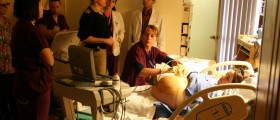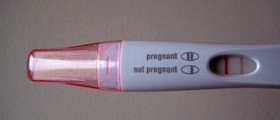
Miscarriage is often referred to as spontaneous termination of pregnancy. Miscarriage usually takes place during the first 6 months of pregnancy, often without mothers knowing about it. In fact, this is the most common problem which can go hand-in-hand with pregnancy.
Since many mothers-to-be are afraid of this occurrence, they commonly ask whether there is a test for miscarriage or some other method which can serve as a premonition of this mishap. Moreover, many people claim how pregnancy tests may be capable of informing one about a potential miscarriage.
How Pregnancy Tests Work
Shortly after the conception taking place, the female organism creates the placenta, being the bond between the mother's body and the growing zygote. The placenta is created in order to supply the zygote with the necessary nutrients and nourishment. During this time, the placenta creates hCG, being the human Chorionic gonadotropin. This hormone is, therefore, the main sign of pregnancy and once it is present in the female body, pregnancy is taking place.
Basically, pregnancy tests focus on noticing the presence of hCG in the urine or the blood, being positive if the presence of this hormone surpasses 25mlU/ml.
Pregnancy Tests and Miscarriage
A pregnancy test kit is not capable of giving any data other than that regarding the adequate or inadequate presence of the hCG hormone in one's body. However, hCG levels stay high even after a miscarriage, gradually decreasing, but being visible on these types of tests. Thus, the only way of using pregnancy tests for miscarriage diagnosis is to repeat the test several times during pregnancy, looking for negative results appearing after the previous, positive ones. If this happens, you are highly advised to seek medical assistance.
Signs of Miscarriage
Miscarriage is most likely to happen during the first trimester of pregnancy. Namely, it will never happen after 24 weeks, during which hormonal imbalances, immune system problems and infections may lead to cessation of the development of the fetus.
The main symptoms of a miscarriage are blood appearing frequently, possibly accompanied by vaginal cramps, which may also take place alone. Additionally, the cramping can affect the pelvic area as well as the lower back area. Finally, miscarriage may cause signs and symptoms of pregnancy to cease after several days or weeks.
If you notice any of these symptoms, seek medical assistance as soon as possible. Your doctor will perform a vaginal ultrasound check and, in case of miscarriage, remove the fetus with either medicines or surgery.
















Your thoughts on this
Loading...